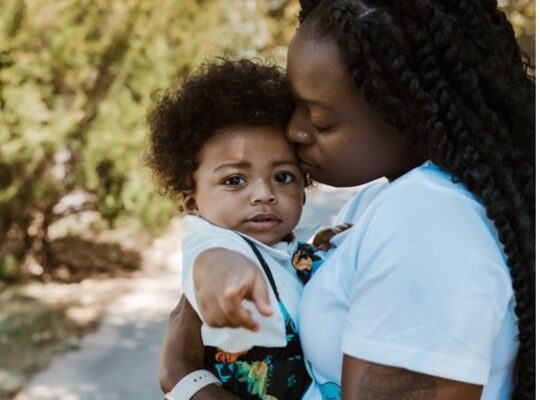My whole goal in life was to break generational curses from the moment I became an adult. My mother and father both taught me to be a hard worker, so that’s who I have always been. Then the COVID-19 pandemic put my life on pause, but in the best way — a way that put me on the path to my purpose.
In early 2020, I was living at home with my mom, working as a tour guide at the state Capitol, and was just starting to find my groove. But once the pandemic hit, I lost my job and was at home like everyone else, where I saw racism I couldn’t ignore — police brutality on the news, and a video circulating town of a girl that decided to say the n-word just because she wanted to. I felt like I needed to do something, so I organized the March on Frankfort and started thriving as an activist and Black woman.
I got married in October 2020, and shortly after, I got pregnant. Sadly, I had a miscarriage. I was devastated, confused and searched for answers that I never got. I knew that miscarriages can happen, but I felt so alone and like I didn’t have the information I needed to cope with it.
Then, in January 2021, I found out I was pregnant again, and was SO excited — and so scared. Scared I would have a miscarriage, scared I would die giving birth, scared to be a parent.
October 22, 2021 — the day my sweet sonshine, Mylo, was born — was both the best and scariest day of my life. I labored naturally for about 26 hours, in hopes of delivering my son unmedicated. But after laboring for that long, Mylo got stuck around 6 cm and I needed a c-section. I had a midwife at Lexington Women’s Health, but sadly did not have the means to secure a doula. A part of me feels deeply that if I had access to doula services covered by my insurance, things might have gone the way I planned. Fortunately, the c-section went smoothly and Mylo was born healthy.
After my birthing experiences, I needed to dive into Black maternal health and get all the information I could and to become an advocate for other moms and for better Black maternal health in our state. Parenthood and giving birth is full of complicated emotions, and I knew that what I went through, someone else was going through, too. I wanted to be a part of something bigger than me, I want to be the resource I wish I would have had.
I met ACLU-KY senior policy strategist and Breaking Barriers Council leader Jackie McGranahan during my first Black Maternal Health lobby day at the Capitol, and she asked me to serve on the Breaking Barriers Council.
I ended up going through my darkest times while serving on the Breaking Barriers Council. Postpartum depression was the silent beast I read so much about. I had hoped I wouldn’t experience it, but it came, and it hit me hard. It was the darkest, longest lingering cloud that I have ever had to experience. I struggled a lot of days, just holding Mylo and wondering why I wanted to not exist anymore.
I had an amazing support system, don’t get me wrong – but what do you do when you feel like you’re asking for too much from everyone?
I suffered silently for some time, but with the help of my support system and the BBC, I have seen the light. I found an amazing therapist thanks to Megan Thee Stallion's mental health platform. I scheduled all the appointments I needed to take care of myself, and I am here now, finally. I AM BACK.
I am so thankful to work alongside some amazing Black birth workers who educate me and at times console me when I still have my first-time mommy feels sneak up. It’s important for all birthing people and parents to know: it’s okay to not be okay at times, but you matter.
I am Katima Smith-Willis, a member of the Breaking Barriers Council, and I am here to help further educate my community on the resources that are here and to bridge the gap for Black women.

